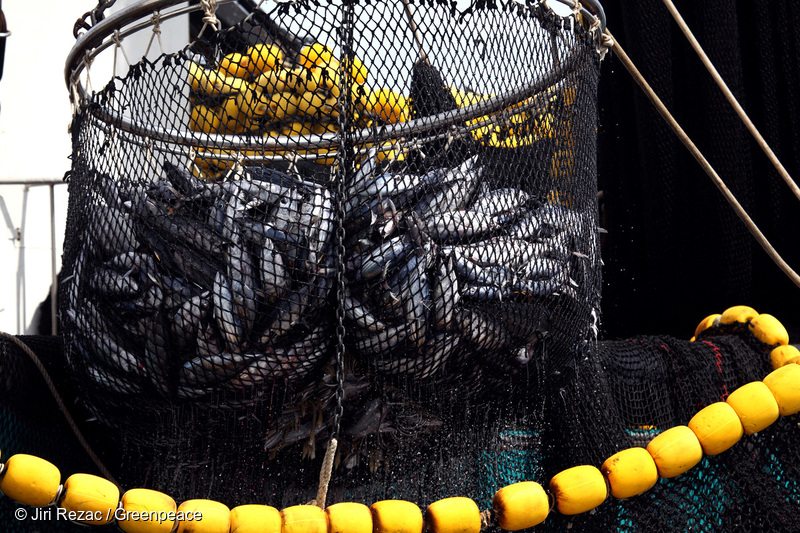We’re calling on the seafood industry and major grocery stores to do their part in protecting our oceans.

Last week, Greenpeace released its ninth edition of Carting Away the Oceans, an annual report ranking U.S. supermarkets on seafood sustainability. While most companies (20 out of 25 profiled) received passing scores, there is significant work the U.S. retail sector must do to address destructive fishing, overfishing, and growing concerns about human rights abuses and violence in the global seafood industry.
Front-runners Whole Foods, Wegmans, Hy-Vee, and Safeway lead the pack, with publicly available sustainable seafood policies, increased labeling and information for customers, and efforts to offer ocean safe tuna, protect sensitive marine habitat like the Bering Sea canyons and call on Congress to help stop Illegal, Unreported and Unregulated (IUU) fishing.
Laggards like Walmart, Kroger, Albertsons, and Publix continue to stall on important sustainability and social responsibility efforts. Rather than change their supply chains, strengthen policies, and publicly advocate for the protection of both the ocean and seafood industry workers, these retailers are offering excuses and empty promises to their customers.
Publix is a noteworthy example. Coming in at an underwhelming 23rd this year, Publix is the only one of the ten largest U.S. grocery retailers to fail our report. Publix ties Kroger in selling the most Red List species of any profiled retailer (18), and when Greenpeace called into question its poor performance, Publix attempted to placate the public’s concerns by saying there’s simply too much it’s doing to share for inclusion in the Carting Away the Oceans report. Perhaps Publix could take a few notes from industry leaders to get an accurate perspective of what “too much” work entails. From the scant information it shares publicly, Publix is failing on multiple fronts.
Unfortunately, industry front groups like the National Fisheries Institute continue to answer for the biggest tuna brands in the country and greedy supermarket chains that prefer to exploit the oceans and human beings in the quest for short term profits. Rather than focus on science-based solutions, too many companies in the seafood industry prefer to spread misinformation from front groups tied to notorious PR firms like CounterPoint Strategies. Luckily, U.S. supermarkets and the public are wary of such bombastic rhetoric, and are clear that the state of our oceans and seafood industry workers are in peril.
Let’s have a direct conversation about what can and must be done, not industry talking points delivered by front groups. I invite companies like Kroger and Publix to sit down with Greenpeace and have an honest conversation about the state of our oceans and discuss solutions to the rampant human rights abuses occurring worldwide in the industry. We can disagree about tactics, though the fundamental truth is that unless things change, we’ll be lucky if there are many fish left to catch in a few decades. There are options to more sustainably harvest seafood, and continuing to ignore the cost to our environment and human beings is not a sustainable business model.
If not for the sake of our oceans and the people who depend on them to survive, think of your shareholders and your customers. What will they say when more progressive retailers are continuing to move ahead in sales and brand image? How will future generations view your actions? What legacy are you ready to leave when you retire?
While I speak specifically to retailers that are dragging along, like bottom contact gear that rips up the seafloor day after day, this is an open call to the global seafood industry to transform its operations. Listen to the conservation, labor, and human rights communities, stop hiding behind industry trade groups, and think about the future, if not for the ethical reasons, for the sustainability of your company.
We’re watching and waiting. And we’ll be back next year to evaluate your progress, or lack thereof, for the continued benefit of our oceans and the people worldwide that rely on them.


